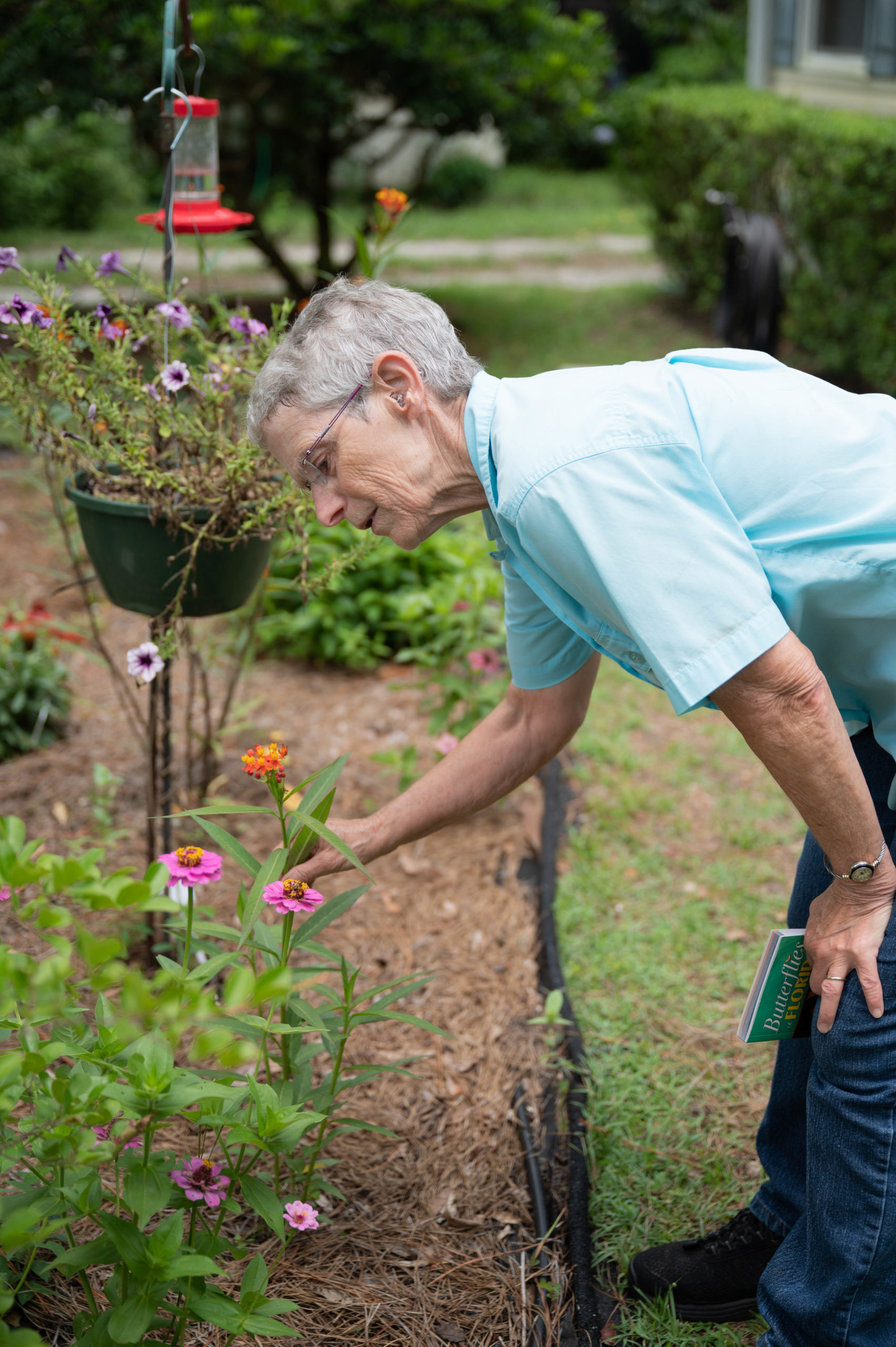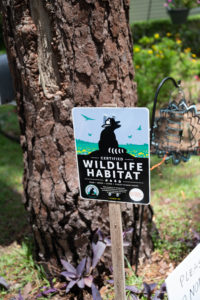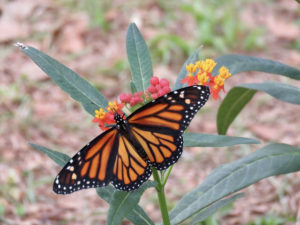
Advent Christian Village is located on over 1,200 breathtaking acres along the historic Suwannee River. With neighborhoods across the property, magnificent oak trees and nature trails bring the beauty of north Florida to the backyards of our members. ACV member, Liz Reynolds, took a special interest in expanding the beauty of the community and her neighborhood when she moved to Dowling Park in 2017. While wildlife has always been an interest of Liz’s, it was not until admiring her neighbor’s garden that she felt confident in adventuring into creating a butterfly and bird habitat of her own.
In the early fall of 2021, Liz sought certification from The National Wildlife Federation (NWF), America’s largest wildlife conservation and education organization. The federation expresses they are “pleased that Liz Reynolds successfully created a Certified Wildlife Habitat® through its Garden for Wildlife program.” In addition, Liz’s habitat has been co-certified with NWF’s state affiliate, Florida Wildlife Federation.
This garden supports birds, butterflies, bees, frogs, and other local wildlife. Every Certified Wildlife Habitat garden provides natural sources of food, water, cover, and places to raise young and is maintained in a sustainable way that incorporates native plants, conserves water, and doesn’t rely on pesticides.
Celebrating over 45 years, the Garden for Wildlife movement has recognized over 2,000 Certified Wildlife Habitat gardens across the United States to date, encompassing more than 2.5 million acres that support wildlife locally. Backyards, urban gardens, school grounds, businesses, places of worship, campuses, parks, farms, zoos, and community landscapes can all be recognized as wildlife habitats through the program.
 “Anyone, anywhere can restore wildlife habitat right in their own yards and communities,” said NWF naturalist David Mizejewski. “Whether you garden in a suburban yard, an urban area, or a rural plot of land, you can make a difference for local wildlife. Creating a Certified Wildlife Habitat garden is fun, easy, and makes a real difference for neighborhood wildlife. It’s the perfect grassroots way to think globally and act locally and help birds, butterflies, bees, and other wildlife,” he added.
“Anyone, anywhere can restore wildlife habitat right in their own yards and communities,” said NWF naturalist David Mizejewski. “Whether you garden in a suburban yard, an urban area, or a rural plot of land, you can make a difference for local wildlife. Creating a Certified Wildlife Habitat garden is fun, easy, and makes a real difference for neighborhood wildlife. It’s the perfect grassroots way to think globally and act locally and help birds, butterflies, bees, and other wildlife,” he added.
Liz explains why she created and certified her habitat: “I enjoy watching wildlife and wanted to do my part to help. Redesigning my yard to make it more inviting to wildlife not only gives me great wildlife watching opportunities, but it also helps me to be greener – reducing lawn to mow, cutting down on watering, and saving time, in the long run, to enjoy time outside.
My garden is a work in progress. I started with just a few native milkweed plants to attract endangered Monarch caterpillars and added flowers to provide nectar. Milkweed is the host plant for Monarch and Queen butterflies. They lay their eggs and the resulting caterpillars eat the milkweed leaves until they are ready to make their chrysalises. Since then, I have enjoyed researching and adding native host and nectar plants for a variety of butterflies. To attract birds, I have birdbaths, feeders, and a couple of bird houses around our front and back yards. I use no pesticides, so some of the plants become sacrificial as they are eaten by various caterpillars. The plants recover by growing back from their roots. The garden has grown and is alive with birds, butterflies, bees, and other pollinators I hadn’t seen before.”
 Florida is one of NWF’s many partners in the Certified Wildlife Habitat® program. Habitats in partnering states have national and state certifications.
Florida is one of NWF’s many partners in the Certified Wildlife Habitat® program. Habitats in partnering states have national and state certifications.
Every Certified Wildlife Habitat garden is now also part of the Million Pollinator Garden Challenge, a national effort to create a million gardens that provide habitat for declining pollinator insects such as butterflies and bees.
Liz’s home is located in our manufactured home neighborhood, allowing her to have more space to freely create a garden of this sort. For ACV members that do not have access to space right outside their home or apartment, we are proud to offer a community garden to all of our members. Here, members can grow vegetables, fruit, flowers, and more all while fellowshipping with fellow members and friends.
Click here for more Village Streams articles.